NNI Sets the Tone for Aboriginal and Torres Strait Islander Students Exploring Graduate Studies in the U.S.
The Australian Aurora Education Foundation begins its U.S. Study Tours for prospective graduate students at U of A before heading to private east coast universities.
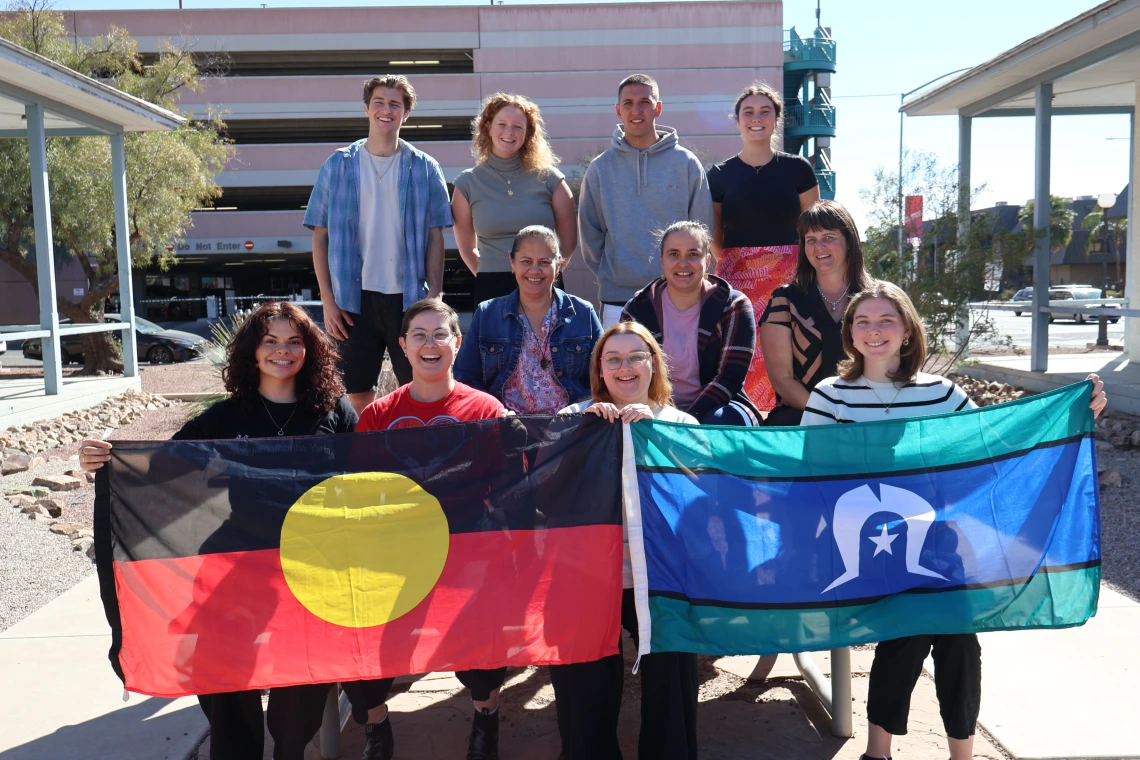
As a college-educated Ngarrindjeri and Adnyamathanha woman, Indigenous Australian lawyer Gail Brennan qualified to apply for the 2025 Aurora Education Foundation U.S. Study Tour.
Historically, these tours went to just a handful of prestigious private universities on the east coast – namely NYU, Columbia, Harvard and MIT – to give prospective Aboriginal and Torres Strait Islander graduate students a sneak peek at the top-tier educational opportunities available to them in the U.S.
But, as leadership in the Foundation began looking for other colleges in the states with programs
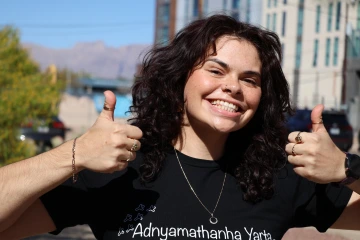
Australian Indigenous lawyer Gail Brennan in Tucson.
geared specifically toward the advancement of Indigenous Peoples, colleagues at Harvard University suggested the Foundation check out the University of Arizona, with specific attention given to the Native Nations Institute (NNI).
To her surprise, Brennan says that she was overwhelmed by signs that she’s on the right path since she arrived in the southwestern U.S. “There are ways that we get reassured at times that we're in the right places at the right time,” she says.
For instance, conversations with NNI faculty and staff revealed that researchers here have traveled to Brennan’s homelands in Ngarrindjeri Country, including visits to Camp Coorong on the southwestern coast of the continent, which is where Brennan says she learned how to weave and make feather flowers as a girl. Then there was the book on the Ngarrindjeri People that she found on a shelf at NNI.
“I flipped a couple of pages and on the second or third page I opened to, (I saw) a photo of one of my Nanas…singing with other aunties of mine,” Brennan says. On the adjacent page were the lyrics to a song her grandfather had written.
“I feel very privileged and blessed to share this space,” Brennan said, summarizing the first five days of her five-week tour of higher ed campuses in the states.
Breaking the Glass Ceiling
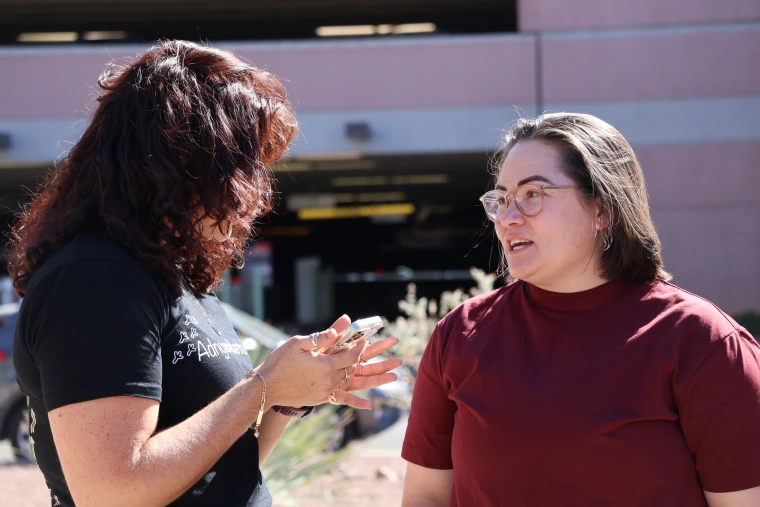
Aurora Education Foundation Deputy CEO Tamara Murdock (right) and Gail Brennen in Tucson.
The Aurora Education Foundation is an Indigenous organization that supports Aboriginal and Torres Strait Islander students to realize their full potential. Through Aurora’s interconnected pathways they walk with students from high school through to university and the workplace, redefining Indigenous educational and employment success.
Aurora Foundation Deputy CEO and Head of Strategy Tamara Murdock (Noongar) is herself an alumnus of Aurora’s programming and a graduate of Oxford University in the UK. Oxford is one of the schools visited during Aurora’s annual UK Study Tour.
Murdock says that Aurora’s Study Tour program began as sort of a challenge to naysayers who suggested it would be impossible to see First Nations Australian students graduate from elite universities overseas. Today, she says the program has a 94 percent acceptance rate for Study Tour participants who apply to the elite graduate schools included on the tour and a 100 percent graduation rate for those who go on to accept an offer of admission.
According to Murdock, a portion of the Aurora Foundation’s success in supporting their students to attend and graduate from some of the world’s top colleges may be attributable to the organization’s efforts to help students interact firsthand with other First Nations Peoples who have succeeded in these competitive spaces while also supporting students’ efforts to build networks in their prospective graduate communities before applying to attend.
For example, every study tour includes at least one Indigenous person who has previously graduated from one of the schools on the tour. Usually, that person is themselves a study tour alumnus. The daily program during the tour is also divided evenly between on-campus meetings arranged by the students themselves and group events with the larger tour cohort.
Explains Murdock, “If you have a strong sense of yourself and your identity as a First Nations person, and if you are able to sustain a strong community, particularly if you're away from your country or away from your homeland…you have a much higher chance of not just surviving, but thriving in these spaces.”
Setting the Tone in the Desert Southwest
The Aurora Foundation’s 2025 visit to NNI was only the second study tour ever to include U of A or any other public institution, for that matter. And, according to Murdock, after the group’s first trip to
NNI in 2024, Aurora Foundation leadership determined that every future U.S. Study Tour should start in Tucson.
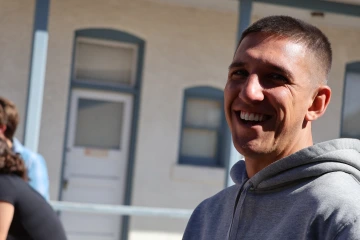
“What we do here is more than just talking about the academics,” Murdock says. “It's more than just talking about what it might be like to study at U of A. It's going and spending time with community. It's grounding yourself in the lived experience of Native mob here. And then being able to say…We have shared experience here but also there's a lot to learn from one another.”
And, says Murdock, that extra exposure to Native American communities and professionals is likely to help the students on the U.S. Study Tour better understand what they need to succeed in a graduate program and community before visiting schools on the east coast. “I think that's really powerful,” says Murdock, “and I think that's really changed the structure of the study tour.”
Enduring Impact
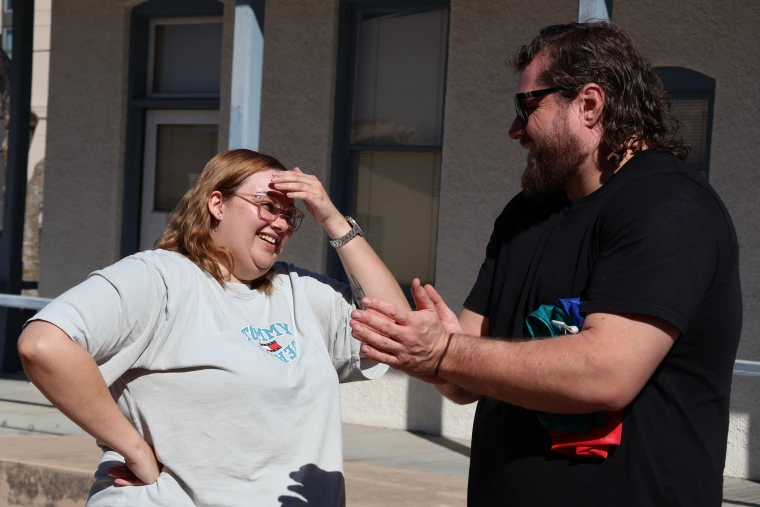
Hope Kuchel (left) and Aurora Education Foundation Symposium and Study Tour Leader Mark Mackay at the Udall Center.
Hope Kuchel is a Barkindji woman who has grown up participating in the Aurora Foundation ecosystem since she was about 12 years old. Kuchel recently graduated with her bachelor’s degree in criminology and sociology from the University of Melbourne and her honors degree (the equivalent of a year-long Master’s program) from Deakin University. She credits the Aurora Foundation with helping her to recognize her own academic potential and providing resources to facilitate the transition of her professional ambitions into reality.
“If I think about it long enough, it makes me really emotional to think that one program that intersected with me when I was…in high school… changed the outcome of my life in so many ways,” Kuchel says.
Kuchel says that participating in both the UK and then the U.S. Study Tours offered by Aurora, as well as leveraging the other types of support they provide for students, prepared her to think critically about applying for a graduate program and to really examine each university for what it had to offer. “I look at the (Study Tour) program as really giving me the push I need but also exposing me to so many more opportunities I wouldn't have had the chance to participate in,” she says.
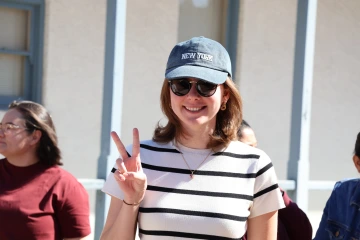
Whether or not any of the students from this year’s U.S. Study Tour end up applying to the U of A for graduate school is secondary to NNI’s and the Aurora Foundation’s shared goal to see Indigenous sovereignty and governance mechanisms strengthened worldwide.
Says Murdock of the Foundation’s mission, “We know that if we can support some of our (Indigenous) mob to ascend into positions of leadership, to ascend into positions of power, to be the people who are calling the shots on policy, on legislation, on how funding is allocated, then we will achieve the type of systemic change that we need.”
And that’s something both organizations can agree on.

